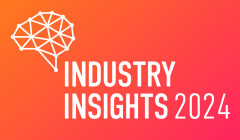
Creativebrief unveils the trends shaping modern marketing
The Industry Insights 2024 report explores the topics on marketing leaders minds today

The 10 Group’s James Myers reflects on LGBTQIA+ inclusion within the industry and considers how we can continue to strive for better

Over the course of my twenty-year career in communications, working in companies of varying sizes and across a diverse range of industries, I have seen firsthand the transformation in how LGBTQIA+ people are treated in the workplace. As a white, gay, male professional, I can confidently say that things haven't been as tough for me as they have been for others in our community. Nonetheless, I have experienced firsthand the positive impact that inclusion can have – not only on the wellbeing of those in our industry, but also on the quality of our work and our capacity to innovate.
As well as acknowledging and celebrating how far we've come, it’s important to look back at our journey and see how far we still must go before achieving true inclusivity within our industry. Here are some of the most common barriers to inclusivity that I have seen throughout my career.
As well as acknowledging and celebrating how far we've come, it’s important to look back at our journey and see how far we still must go before achieving true inclusivity within our industry.
James Myers, Commercial Director, The 10 Group
The business world is starting to realise the importance of diverse leadership. However, the lack of representation at decision-making levels is still a huge problem. The issue of tokenistic board appointments risks undermining the progress we've made so far for this community. We need more diverse boardrooms to ensure the decisions we make are fair and rational, and to give the next generation of leaders a set of role models to aspire to.
One of the ongoing struggles faced by LGBTQIA+ professionals is the constant battle against assumptions about our personal lives. If you ask about someone's wife instead of their husband, for example, it makes them feel trapped between two options: coming out to you on the spot, or going along with your assumption and masking their authentic self. Choosing to educate others on our lives is an individual decision, but promoting awareness and understanding should be a collective effort.
Bias promotions and hires can lead to an individual’s qualifications often being overlooked. Companies need to be aware of both sides of the bias spectrum. From recruitment practices to day-to-day interactions, we need to make sure that everyone, whatever their gender, sexual orientation or ethnicity, has an equal opportunity to thrive. There's much more we can do as an industry to educate ourselves about the impact of unconscious biases and how they prevent progress towards equality.
Not all companies face these barriers; some have made impressive progress towards breaking down silos and fostering a culture of diversity. Their successes demonstrate that together, we can break down barriers that hinder progress, inspire change at all levels of leadership, and raise awareness about unconscious bias. As a board member at The 10 Group, I recognise the important role I have to play in helping everyone in my team feel included, supported and valued.
Here are my top tips for promoting a more inclusive workplace.
These challenges and tips are not unique to a career in PR and communications. There are so many industries that I have worked with that still grapple with these issues. By engaging in open dialogue and sharing best practices, we can collectively work towards a more inclusive future for this generation and the next.
James is an integrated communications expert with over 20-years of experience in the media industry. The industry veteran, former Managing Director of communications agency, TVC Group and ex-Chief Client Officer at The Economist, James has an enviable list of stories from world class campaigns. From Felix Baumgarterner jumping from the edge of space to performing a barrel roll in a Land Rover, James understands how to bring an editorial mindset to marketing and campaigns. At The 10 Group, James leads a team of brand strategists, social experts, creatives, and journalists who specialise in producing cut through campaigns for his clients and clients' brands.
Looks like you need to create a Creativebrief account to perform this action.
Create account Sign inLooks like you need to create a Creativebrief account to perform this action.
Create account Sign in